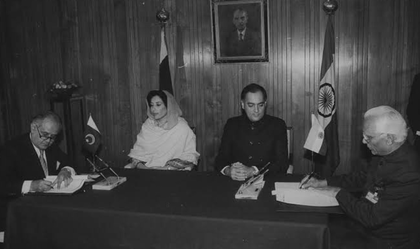Pakistan's blackmail: BJP slams Congress for compromising India’s nuclear doctrine
By IANS | Updated: May 25, 2025 15:37 IST2025-05-25T15:34:09+5:302025-05-25T15:37:57+5:30
New Delhi, May 25 Close to Prime Minister Narendra Modi’s ‘no nuclear blackmail’ warning to Pakistan, the BJP ...

Pakistan's blackmail: BJP slams Congress for compromising India’s nuclear doctrine
New Delhi, May 25 Close to Prime Minister Narendra Modi’s ‘no nuclear blackmail’ warning to Pakistan, the BJP on Sunday targeted the Congress for compromising the country’s nuclear interests in the past.
Accusing the grand old party of choosing “optics over national security,” BJP leader Amit Malviya tore into Prime Minister Rajiv Gandhi’s “weak-kneed foreign policy and a misplaced faith in goodwill diplomacy” that put Indian into a position of disadvantage three decades ago.
Malviya, in-charge of BJP's National Information and Technology Department, said in a social media post, “Strong leadership means safeguarding sovereignty, not exposing vulnerabilities.”
He said, “In 1988, Prime Minister Rajiv Gandhi signed an agreement with Pakistan’s Benazir Bhutto that compromised India’s nuclear doctrine before it was even formally established.”
Attaching a photograph of late PMs Rajiv Gandhi and Bhutto, he said, “The Indo-Pak Nuclear Agreement — formally titled the ‘Agreement on the Prohibition of Attack against Nuclear Installations and Facilities’ — was signed on December 31, 1988. While it was framed as a confidence-building measure, in reality, it revealed India’s nuclear infrastructure to an adversary that has repeatedly sponsored terrorism and conflict.”
“Under this agreement: India and Pakistan exchange a list of all nuclear installations annually. The intent: To prevent pre-emptive strikes and reduce the risk of nuclear escalation. It came into effect on January 1, 1991, and has been in force since January 1, 1992, regardless of war, terror attacks, or diplomatic breakdowns,” he said.
The decision was driven by a weak-kneed foreign policy and a misplaced faith in goodwill diplomacy — at the cost of India’s strategic and national security interests, said Malviya.
“This is a stark reminder of how Congress, time and again, prioritised optics over national security. Strong leadership means safeguarding sovereignty, not exposing vulnerabilities,” said the BJP leader.
Earlier in his address to the nation on Operation Sindoor, PM Modi signalled a paradigm shift in the government’s policy on matters of national security and terror.
The three core pillars of the Prime Minister’s anti-terror doctrine include decisive retaliation on India’s terms, zero tolerance for nuclear blackmail and no distinction between terrorists and their sponsors.
Several global media outlets, including The Guardian, a UK newspaper, took note of PM Modi’s statement that India would not tolerate “nuclear blackmail” in any future conflict with Pakistan.
Disclaimer: This post has been auto-published from an agency feed without any modifications to the text and has not been reviewed by an editor
Open in app